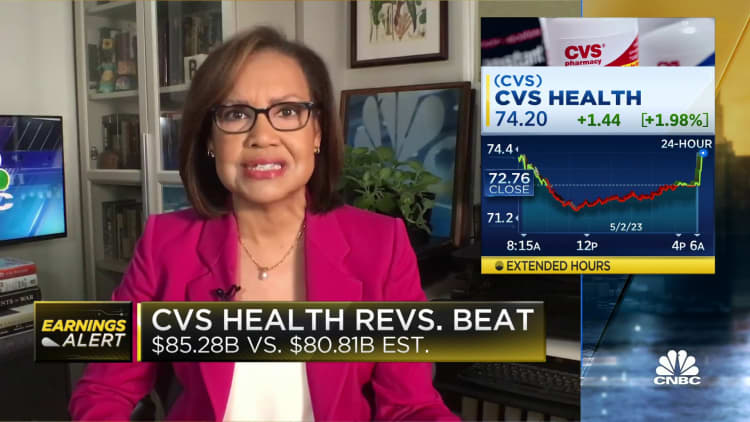[ad_1]

CVS Health on Wednesday reported first-quarter results that beat earnings and revenue expectations, but the company lowered its full-year profit guidance due to costs related to recent acquisitions.
The company’s shares fell more than 2% on Wednesday.
Here’s what CVS reported compared with Wall Street’s expectations, based on a survey of analysts by Refinitiv:
- Earnings per share: $2.20 adjusted, vs. $2.09 expected
- Revenue: $85.28 billion, vs. $80.81 billion expected
For the quarter ended March 31, CVS posted profit of $2.14 billion, or $1.65 a share, compared with $2.35 billion, or $1.77 a share, a year earlier. Excluding one-time items, the company reported earnings of $2.20 per share for the period.
CVS reported total revenue of $85.28 billion, an 11% increase over the $76.83 billion a year earlier.
CVS lowered its 2023 adjusted earnings guidance to a range of $8.50 to $8.70 per share, which is 20 cents lower than its previous projection of $8.70 to $8.90 per share.
The company reduced its guidance due to costs associated with its $8 billion acquisition of Signify Health and its $10.6 billion purchase of Oak Street Health, among other items.
CVS’ health services segment booked revenue of $44.59 billion, a 12.6% increase over sales of $39.62 billion in the same quarter last year. The division includes its pharmacy benefit manager CVS Caremark and health-care services delivered in medical clinics, through telehealth and at home.
Pharmacy claims processed in this division increased 3.7% compared with first quarter 2022 due in part to an elevated cough, cold and flu season.
CVS’ health insurance segment generated revenue of $25.88 billion, a 12% increase from the year before. The division includes Aetna plans for the Affordable Care Act, Medicare Advantage, Medicaid, and dental and vision. Total membership in CVS medical plans increased by 1.1 million to 25.5 million.
The insurance plans’ medical benefit ratio increased to 84.6% from 83.4% a year earlier. This ratio is a measure of total medical expenses paid relative to premiums collected. A lower ratio typically indicates that the company collected more in premiums than it paid out in benefits, resulting in higher profitability.
And CVS’ retail segment booked revenue of $27.92 billion, and increase of 7.8% compared with sales of $25.89 billion in the first quarter of 2022. The division includes prescriptions dispensed in its 9,900 brick-and-mortar drugstores, infusion services, testing and vaccine administration.
Prescriptions filled increased 2.5% compared with the same period last year, again due in part to the elevated cough, flu and cold season. The increase was offset in part by a decline in Covid vaccinations. Excluding this, prescriptions filled increased 4.5%.
[ad_2]
Source link
